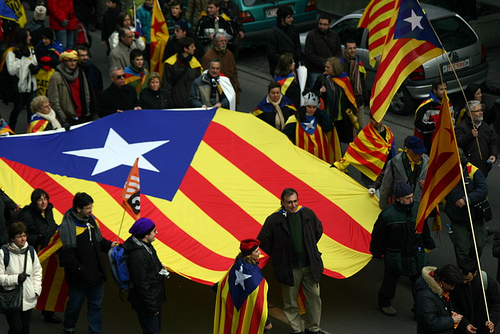Catalonia’s Indignation
Substituting the “Statute of Sau” dated from 1979, and after having been democratically approved by the Catalan regional parliament as well as by the Spanish national parliament, Catalonia’s new autonomy statute (the “Estatut”; the Catalan regional constitution) was approved in referendum by the Catalan citizens on 18 June 2006 and enacted two days later by the Head of State, King Juan Carlos I, with the following header: “Know: That the Cortes Generales [Spanish national parliament] have approved, the citizens of Catalonia have ratified in referendum, and I come to sanction the following Organic Law“. But Spain’s main opposition party—the right-wing Popular Party (PP; Partido Popular)—challenged the Estatut’s legitimacy and appealed to Spain’s Constitutional Court arguing that 114 of its 233 articles were unconstitutional and that it would jeopardize the unity of the state.
On Monday, 28 June 2010—more than four years after its enactment by King Juan Carlos I—the Constitutional Court endorsed the vast majority of the Estatut’s articles, declaring 14 of them unconstitutional and changing 23 others. Considering the huge difference between the 114 articles they claimed to be unconstitutional, and the 14 deemed to be so by the Constitutional Court, many commentators see this ruling as a slap in the PP’s face. Nevertheless, Catalan parties don’t see this as a victory for Catalonia. The indignation among the Catalan society is huge, as the 14 articles declared unconsitutional are considered a significant trim in Catalonia’s self-rule aspirations in important areas such as Catalan language, justice and taxation. The president of Catalonia’s regional parliament, Ernest Benach, said that the ruling will lead to a crisis of state, as it ignores the will that the Catalan citizens expressed during the referendum. And considering that there will be elections in Catalonia in fall, the ruling indeed comes in a delicate point in time. Many commentators argue that with the Constitutional Court’s decision of truncating the Estatut, the door for Catalonia’s comfortable existence within Spain was shut, and that there’s only one way ahead—Independence from Spain. The political parties in Catalonia are preparing for the regional elections to be held in fall, and the ruling will certainly influence their campaigns and the results. A rise in independentist and nationalist votes can undoubtably be expected.
Image: © bernatff (found on Flickr.com)
Share this post!





Seems that Spain has more pressing issues than fight with regional estates.
in response to Espinosa, for Catalonia this is an important issue, not only in the identity issues, which to me are extremely important, but also economically. Catalonia suffers a fiscal plundering of 10% of its GDP every year, that’s about 22000 million euro or 3000 euro per Catalan citizen.
This is unsustainable since in any serious contry wealth redistribution between richer and poorer regions has a limit (around 2 or 3%) to prevent damage to the financial tissue of the richer areas.
This simple concept doesn’t apply in Spain and the redistribution data is systematically kept hidden so as to stop Catalans from knowing exactly how much Spain are stealing, treating us as a colony to be milked. Therefore, the only way for Catalonia to survive is to regain its independence and become a state in the EU.
I agree that Spain has to try to fix “other” issues that are very important right now. Of course you cannot be delaying the rest until the crisis is over. Besides, the resolution of the Text has been waiting for around 4 years.
In the same way, the crisis affects all the State (Spain) but another reason for Catalonia to push for those changes is that they are concerned that the rest of the country is dragging them into crises, and prevents them for eovlving a bit faster than the rest. If they did, of course, that would have a great beneficial implication on the rest of Spain, too. I know it sounds harsh but the way of doing business, working and so on in Catalonia, Madrid, Basque Country, and few other areas are well known to be much mor efficient than the rest of Spain, specially the southern communities. The redistribution of tax benefits and internal investment has always been very unfair for Catalonia.
To me, the constitutional resolution is not satisfactory. Yes, 95% has been approved or minorly modified, but the important 5% is the one that cuts the deal. On a more personal note: Consitutions are a guarantee of people’s and communities rights and duties in a country. They are, however, not written in stone like the 10 Commandments. They are bound to be changed and upgraded. The Constitution and amendments to it were ratified in the late 1970’s maybe it is time for a major review. Also, we have to remember that those deals were signed in a transitional state after a long dictatorship. Any improvement was good, and communities would just sign anything and work from there. That is exactly what they are doing.
In summary, two words: Federal State
Catalonian people will succeed. We’ve got patience, we’ve got faith and our only weapons are democracy and perseverance.
We are here to stay.
*****Catalonia is not Spain*****